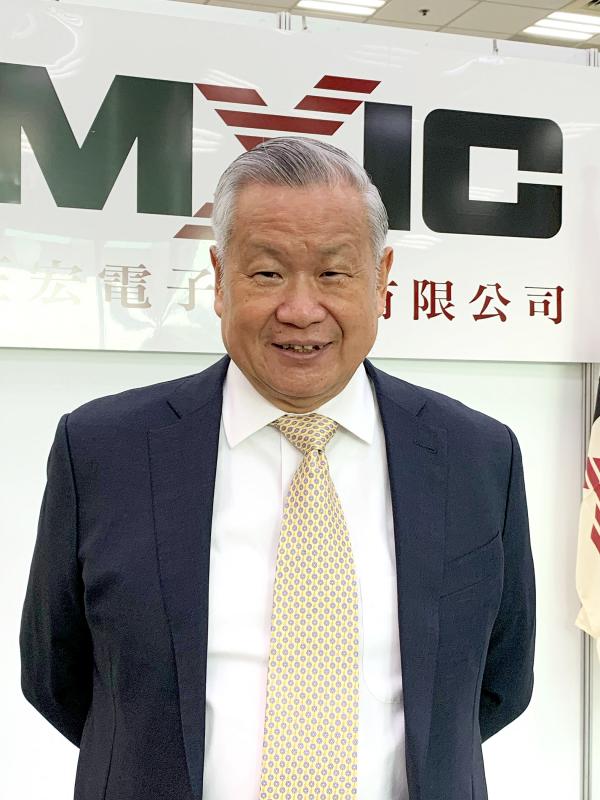Macronix International Co Ltd (旺宏), the world’s biggest supplier of NOR flash memory chips, yesterday said net profit last quarter grew 22 percent quarter-on-quarter as stay-at-home and remote learning trends boosted demand for chips used in PCs and Nintendo Co’s game consoles.
Net profit expanded to NT$1.62 billion (US$56.05 million), from NT$1.33 billion in the second quarter. That translated into earnings per share of NT$0.88, up from NT$0.72 a quarter earlier.
On an annual basis, net profit slumped 13 percent from NT$1.85 billion, or NT$1.01 a share, due to a higher tax payment, the company said.

Photo: Hung Yu-fang, Taipei Times
Gross margin last quarter climbed to 36 percent, the highest since the second quarter of 2018, on higher inventory valuation, the company’s financial statement showed.
Revenue last quarter climbed 18 percent quarter-on-quarter to NT$11.91 billion, the second-highest level in the company’s history.
Macronix gave a relatively positive outlook for the current quarter.
“Our factories are all fully utilized,” company chairman Miin Wu (吳敏求) told investors via teleconference. “Prices for NOR [flash memory chips] are quite stable. Customers are not arguing for [price cuts].”
On top of that, Wu expects NOR flash memory chip supply constraints to worsen next year given fewer suppliers, if the US-China trade dispute remains unsolved.
Macronix already benefits from the escalating dispute between the world’s two biggest economies, as it is seeing new orders trickling after US suppliers of ZTE Corp (中興) were banned from shipping products to the Chinese company without a license.
“Customers are seeking chip replacements for any contingency, though the US government does not ban the use of ZTE [equipment in the US],” Wu said. “We have been seeing new order transfers in the past few months.”
Looking ahead, the Hsinchu-based company gave a positive business outlook.
Wu said Macronix has secured contracts from Apple Inc’s OLED panel suppliers to supply NOR-flash memory chips used in the high-definition displays for the US company’s latest iPhone 12 series.
Macronix has a 50 percent allotment of the orders, he said.
However, the US government’s export restrictions on Huawei Technologies Co (華為) and a ban on using Huawei’s 5G base stations would have an adverse effect on its revenue, as Huawei is its third-largest customer, the company said.
The chipmaker is seeking new orders to fill the void left by Huawei, Wu said.
Macronix expects the automotive sector, particularly autonomous vehicles, industrial devices and medical devices to be its next growth drivers, he said.
Macronix is evaluating expanding its 12-inch wafer capacity to cope with rising customer demand for its first 3D NAND flash memory chips, but no plan has been finalized, the company said.
It plans to ship its first 3D NAND flash memory chip to its customers next month and expects the new chips to contribute to revenue next year, Wu said.
This year, the chipmaker plans to spend NT$6.5 billion on capital expenditures. It is to shut down an older-generation 6-inch fab in the first quarter next year.

SEEKING CLARITY: Washington should not adopt measures that create uncertainties for ‘existing semiconductor investments,’ TSMC said referring to its US$165 billion in the US Taiwan Semiconductor Manufacturing Co (TSMC, 台積電) told the US that any future tariffs on Taiwanese semiconductors could reduce demand for chips and derail its pledge to increase its investment in Arizona. “New import restrictions could jeopardize current US leadership in the competitive technology industry and create uncertainties for many committed semiconductor capital projects in the US, including TSMC Arizona’s significant investment plan in Phoenix,” the chipmaker wrote in a letter to the US Department of Commerce. TSMC issued the warning in response to a solicitation for comments by the department on a possible tariff on semiconductor imports by US President Donald Trump’s

The government has launched a three-pronged strategy to attract local and international talent, aiming to position Taiwan as a new global hub following Nvidia Corp’s announcement that it has chosen Taipei as the site of its Taiwan headquarters. Nvidia cofounder and CEO Jensen Huang (黃仁勳) on Monday last week announced during his keynote speech at the Computex trade show in Taipei that the Nvidia Constellation, the company’s planned Taiwan headquarters, would be located in the Beitou-Shilin Technology Park (北投士林科技園區) in Taipei. Huang’s decision to establish a base in Taiwan is “primarily due to Taiwan’s talent pool and its strength in the semiconductor

Industrial production expanded 22.31 percent annually last month to 107.51, as increases in demand for high-performance computing (HPC) and artificial intelligence (AI) applications drove demand for locally-made chips and components. The manufacturing production index climbed 23.68 percent year-on-year to 108.37, marking the 14th consecutive month of increase, the Ministry of Economic Affairs said. In the first four months of this year, industrial and manufacturing production indices expanded 14.31 percent and 15.22 percent year-on-year, ministry data showed. The growth momentum is to extend into this month, with the manufacturing production index expected to rise between 11 percent and 15.1 percent annually, Department of Statistics

An earnings report from semiconductor giant and artificial intelligence (AI) bellwether Nvidia Corp takes center stage for Wall Street this week, as stocks hit a speed bump of worries over US federal deficits driving up Treasury yields. US equities pulled back last week after a torrid rally, as investors turned their attention to tax and spending legislation poised to swell the US government’s US$36 trillion in debt. Long-dated US Treasury yields rose amid the fiscal worries, with the 30-year yield topping 5 percent and hitting its highest level since late 2023. Stocks were dealt another blow on Friday when US President Donald